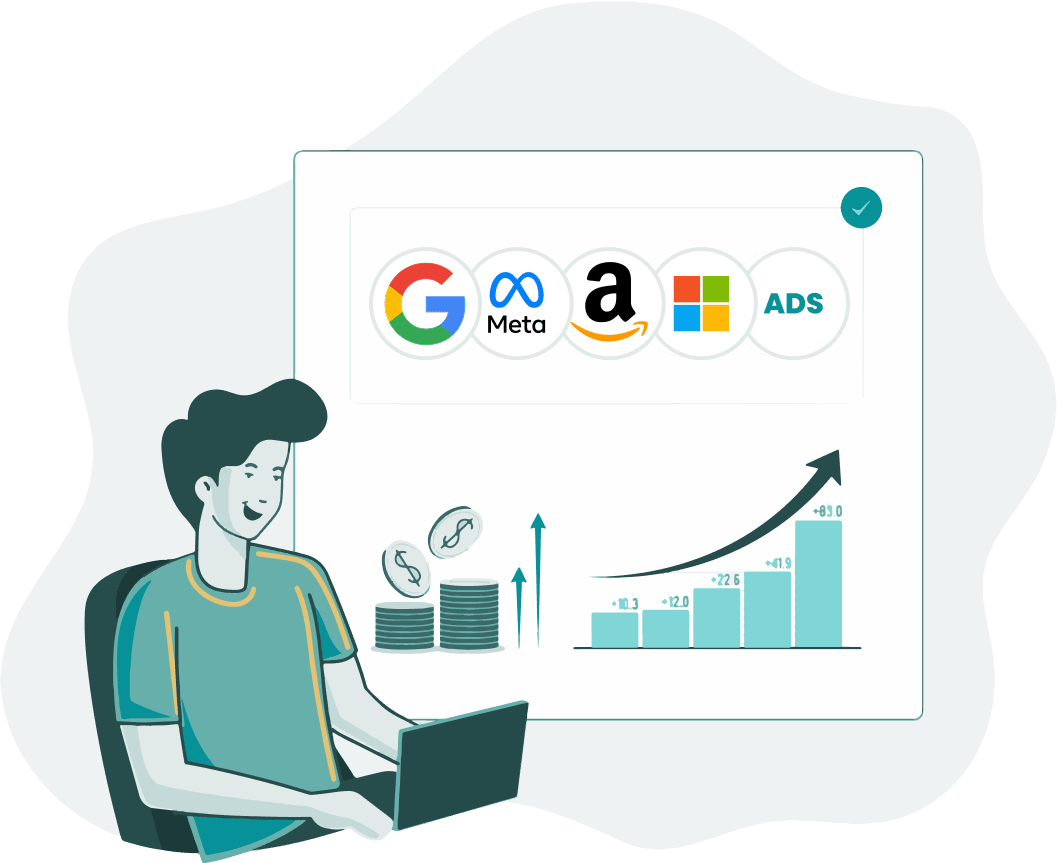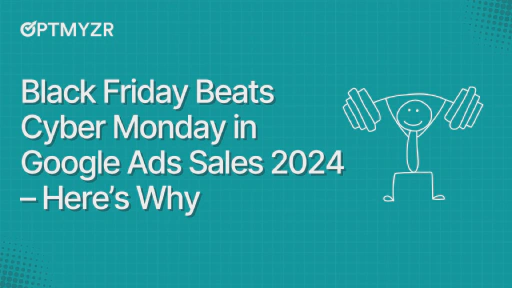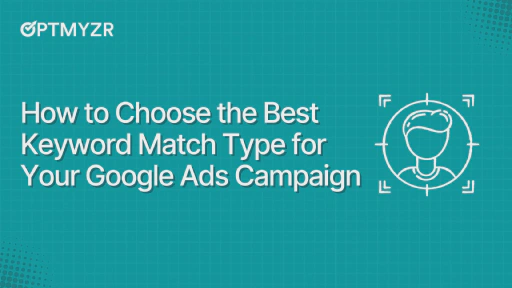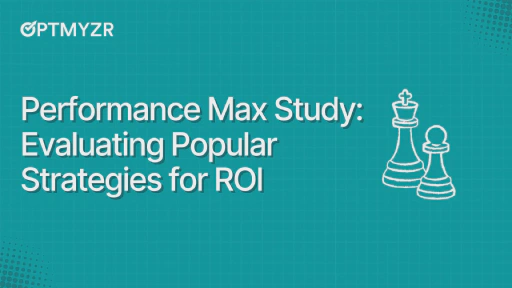During GML 2024, Google shared a really interesting stat: raising your OptiScore 10 points leads to a 15% conversion rate improvement.
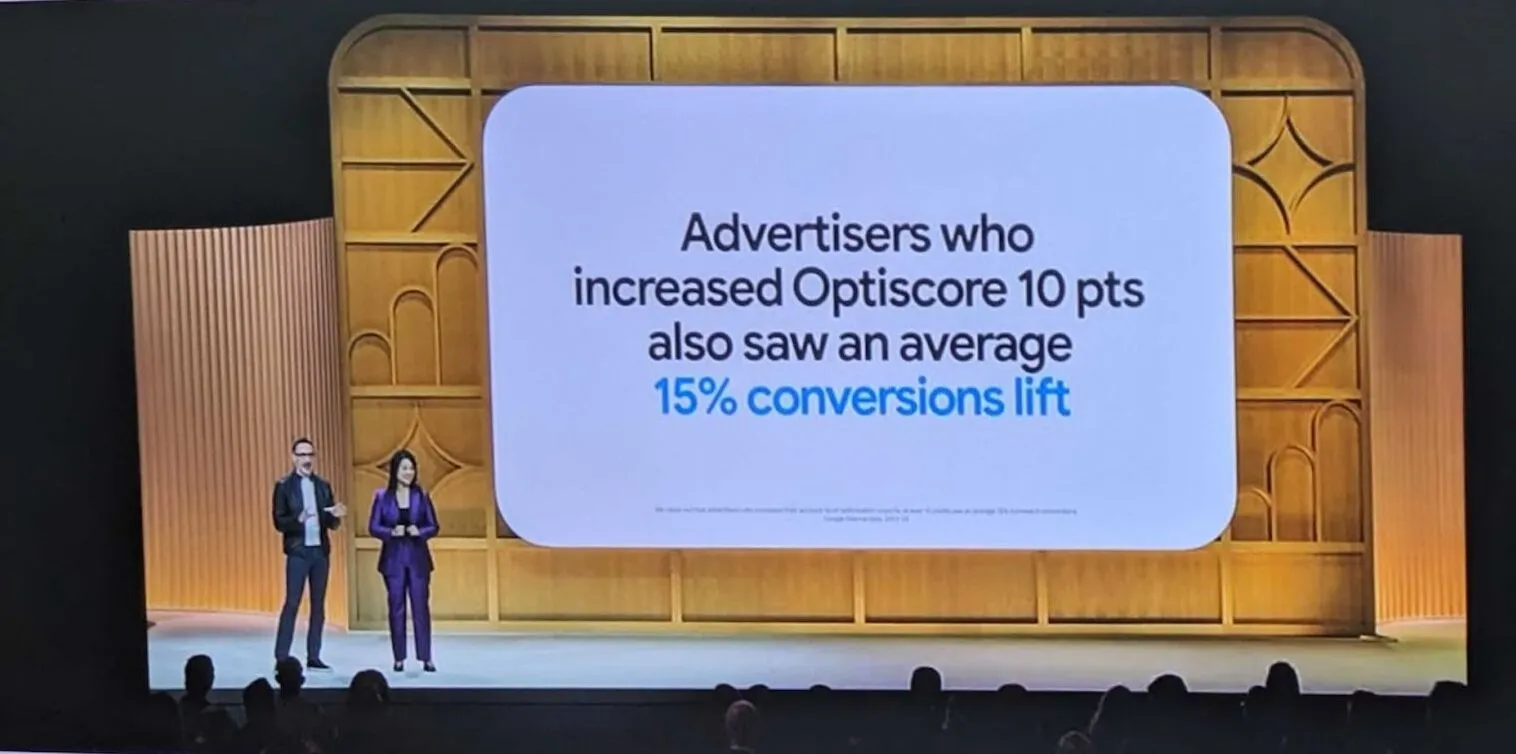
This stat raised eyebrows for a few reasons:
- Advertisers can raise OptiScore by dismissing Google’s recommendations, which can be considered a loophole in the system.
- Maintaining a minimum OptiScore is required for partner status, which doesn’t always align with business and marketing goals.
- OptiScore tends to be conflated with account recommendations, which seem like a sales tool.
For your reference, here’s Google’s OptiScore support documentation:
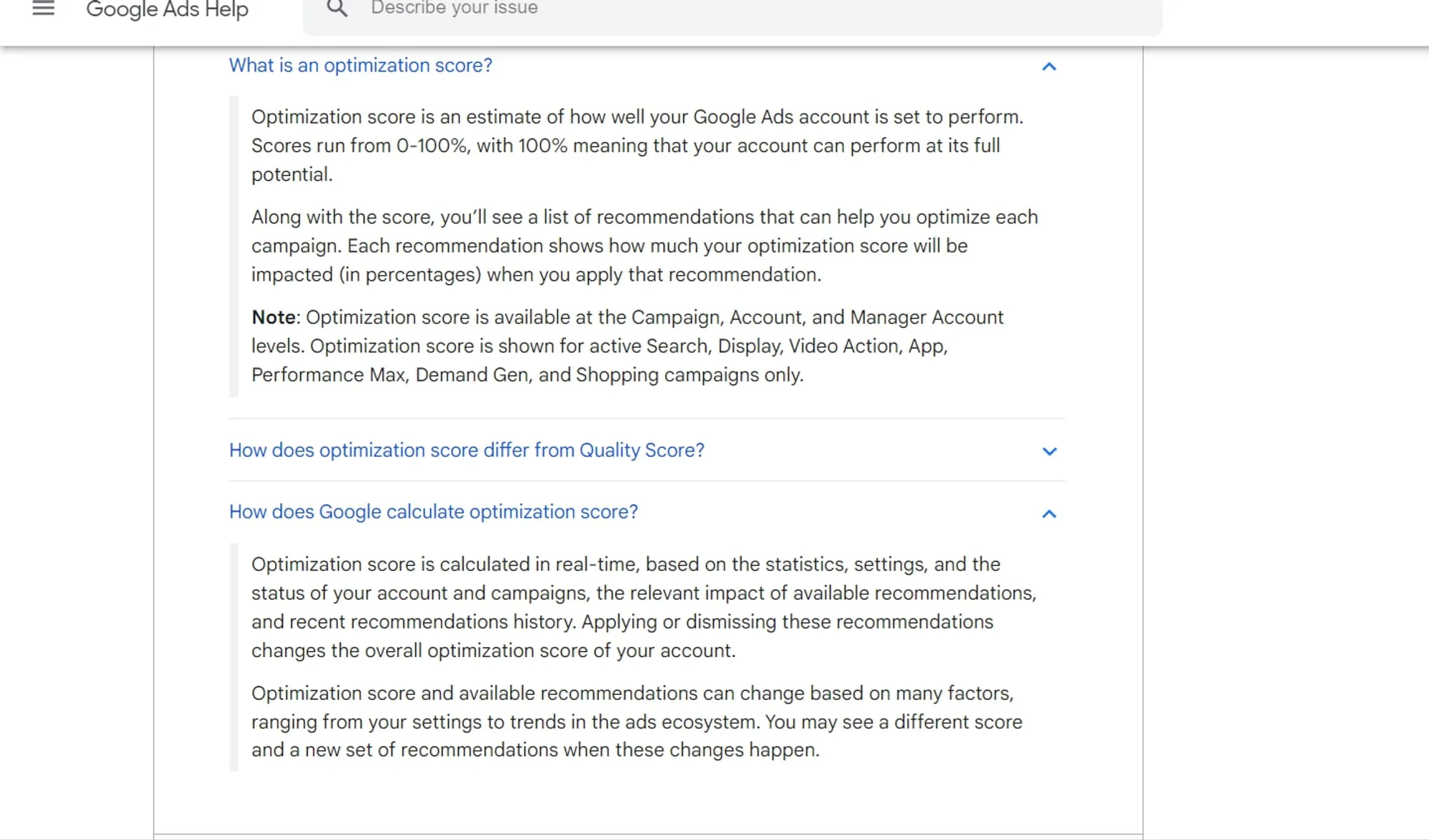
Optimization score is an estimate of how well your Google Ads account is set to perform. Scores run from 0-100%, with 100% meaning that your account can perform at its full potential.
Along with the score, you’ll see a list of recommendations that can help you optimize each campaign. Each recommendation shows how much your optimization score will be impacted (in percentages) when you apply that recommendation.
Note: Optimization score is available at the Campaign, Account, and Manager Account levels. Optimization score is shown for active Search, Display, Video Action, App, Performance Max, Demand Gen, and Shopping campaigns only.”
— Google support documentation
With that in mind, we decided to explore the following questions:
- Is there a performance difference in accounts with 70+ OptiScores (compared to sub-70)?
- Are most advertisers achieving high OptiScores by accepting Google’s recommendations (and do they see better results than advertisers who reject them)?
- Does spend play a role in OptiScore?
For this study, we looked at 17,380 Google Ads accounts that met the following criteria:
- Running at least 90 days
- Spending at least $500 per month
- Maximum spend $1M per month
- Global accounts that could be in ecommerce or lead gen.
The Data
We’ll review each major question in detail, but here’s a quick summary of the findings:
- 32% of accounts have sub-70 OptiScores.
- 19% of accounts achieved an Optiscore of 90+ without accepting Google recommendations.
- 5.5% (less than 1000 accounts) accepted Google recommendations, however the best performance belongs to the 333 accounts that accepted Google suggestions and have a 90-100 OptiScore.
- Spend doesn’t really impact OptiScore—there’s too much fluctuation in the spends to point to any correlation or causation.
- There is a correlation between higher OptiScores (80+) and improved CPA, conversion rate (though sub-70 did ‘win’ this category), and ROAS. There is no correlation between CPC and CTR.
Q1: Is there any performance difference between accounts with high/low OptiScores?
A big reason we wanted to explore the difference in OptiScore brackets is to see if it can be used as a health indicator in accounts. Here is the raw data:
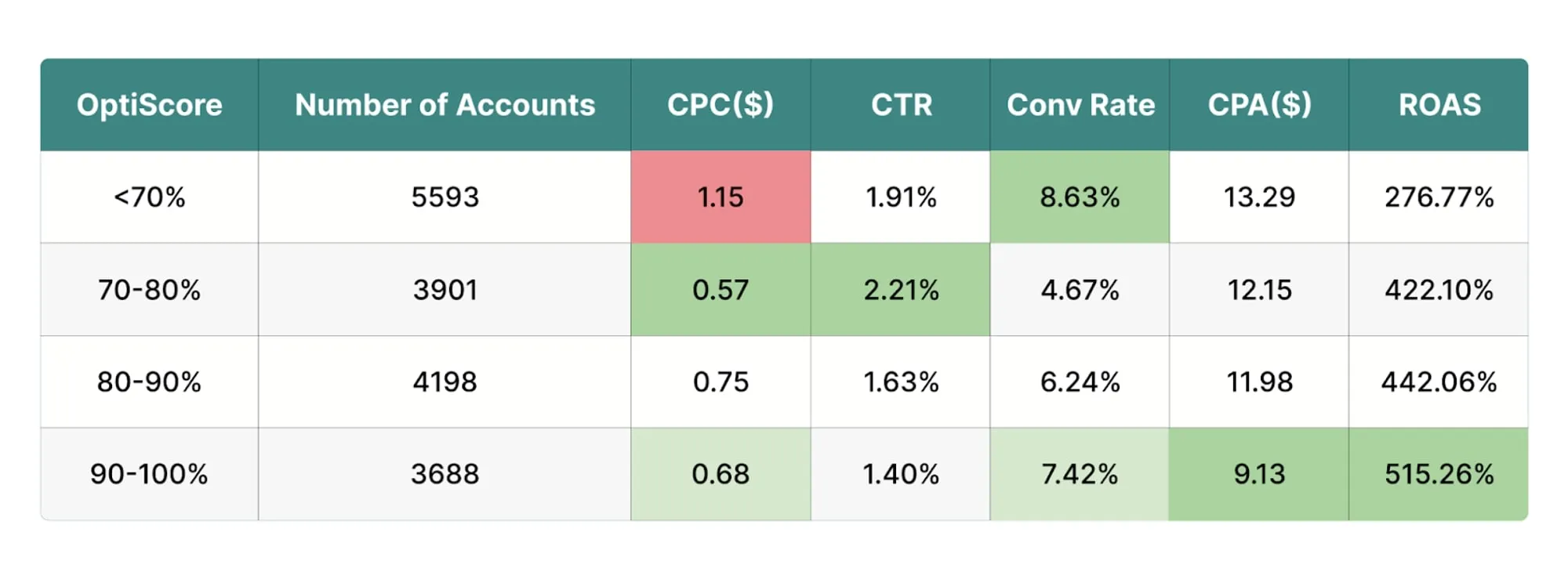
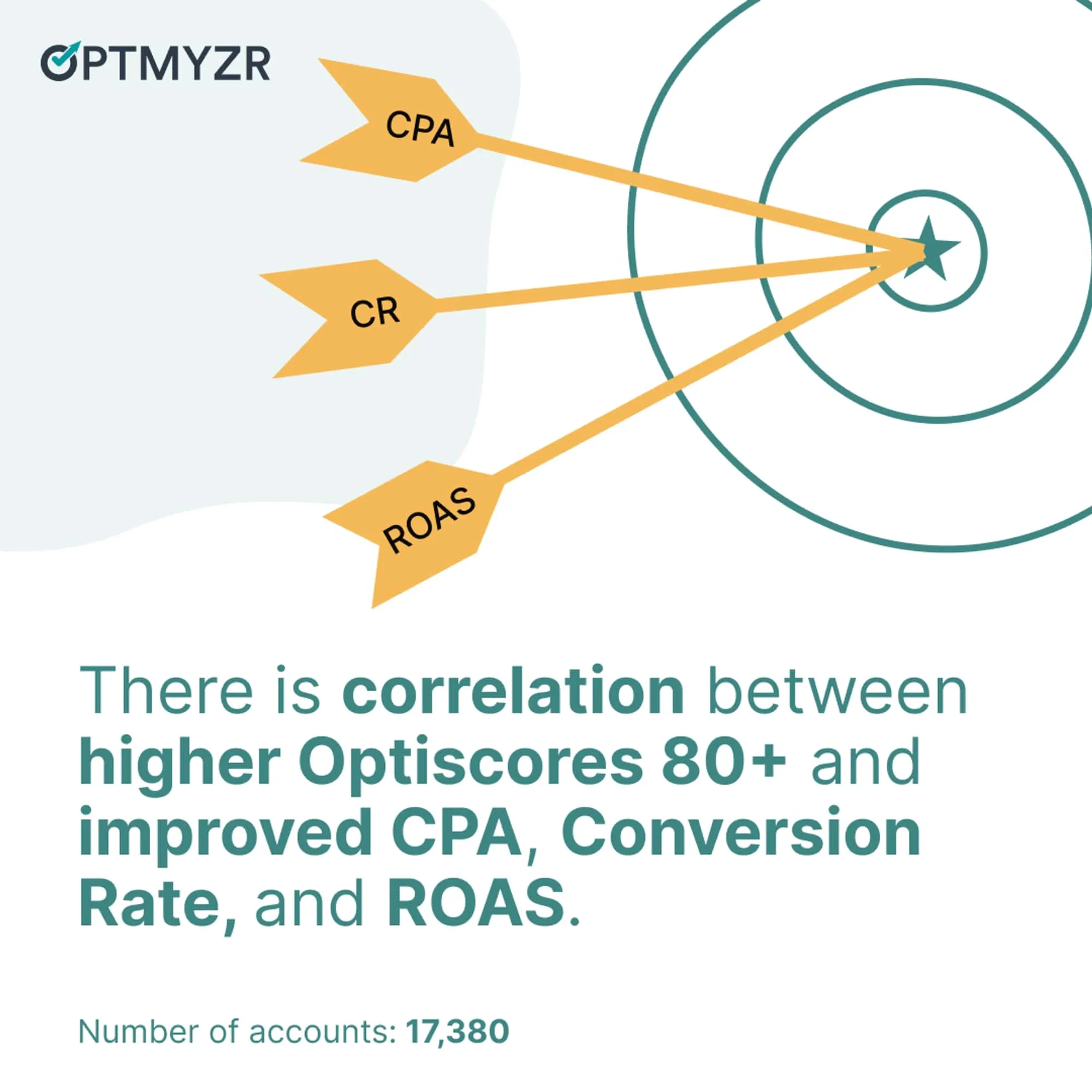
As you can see, there is a clear correlation between high OptiScores and strong performance on all metrics (save for CTR). However, there are a few caveats:
- Sub-70 OptiScore accounts won on conversion rate and nearly won on CTR.
- ROAS is pretty flat between OptiScores of 70–90.
- CPCs fluctuate (although lower OptiScores do correlate with higher CPCs).
Accounts in the 90-100 OptiScore range:
- Beat accounts with a sub-70 score on ROAS by 186%.
- Had the cheapest overall CPAs (despite not having the cheapest CPCs or best conversion rates).
- Had the lowest CTR, which speaks to the value of PMax and visual content being part of the marketing mix.
Regarding Google’s claim on conversion rates being tied to OptiScore improvements:
- This holds true for those going from 70 to a higher tier.
- This does not hold true for advertisers going from sub-70 to 70+.
- CPA and ROAS still win the day as you increase your OptiScore.
Q2: Are most advertisers achieving high OptiScores by accepting Google’s recommendations?
There’s strong skepticism around Google’s OptiScore metric. While our data shows there is a strong performance gain when an account achieves a better OptiScore, there remains the question of how the score is achieved. So ahead of this study, we ran an anecdotal poll and found that the majority of advertisers reject recommendations to raise their score (or outright ignore the metric).
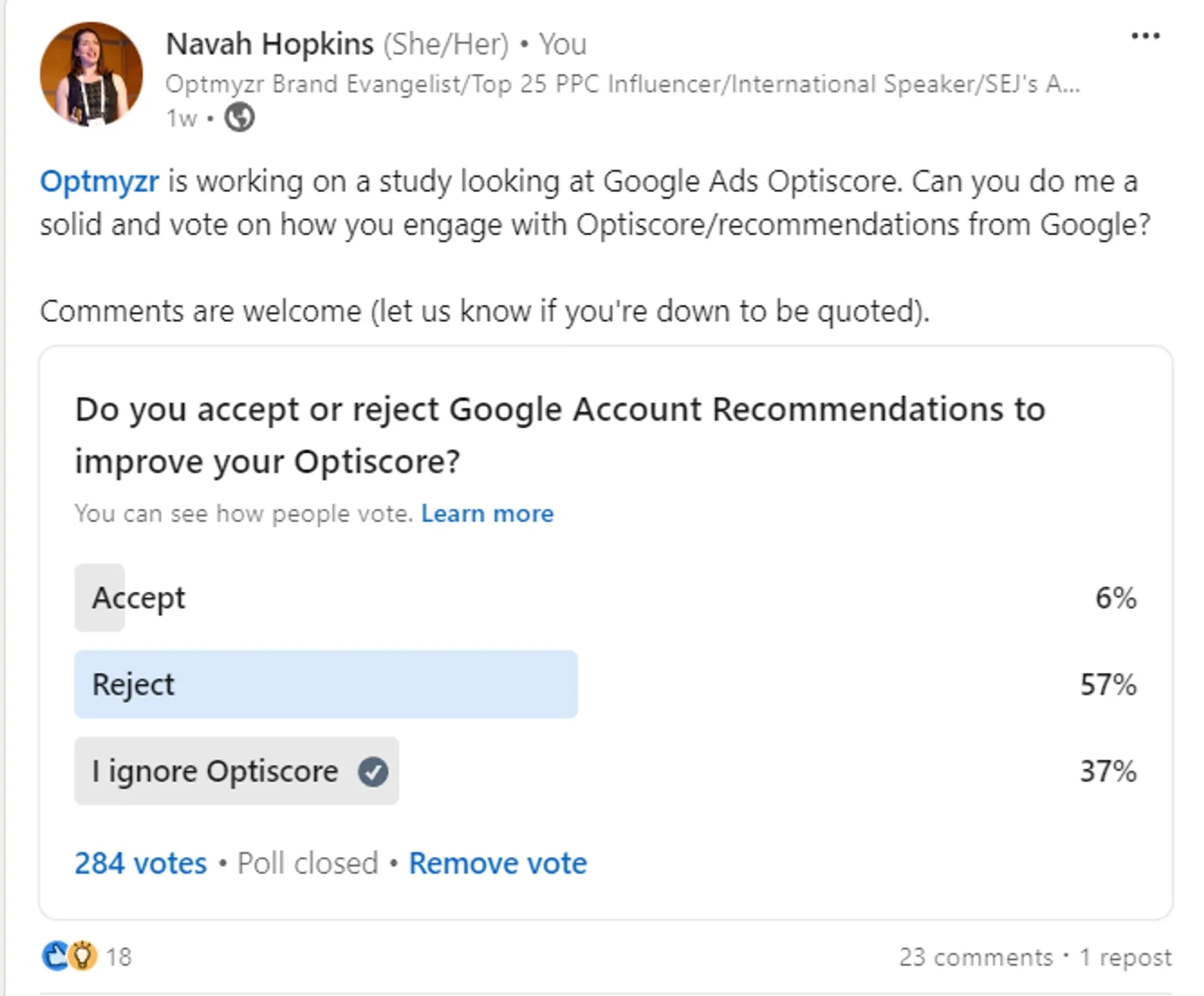
Here’s the raw data:
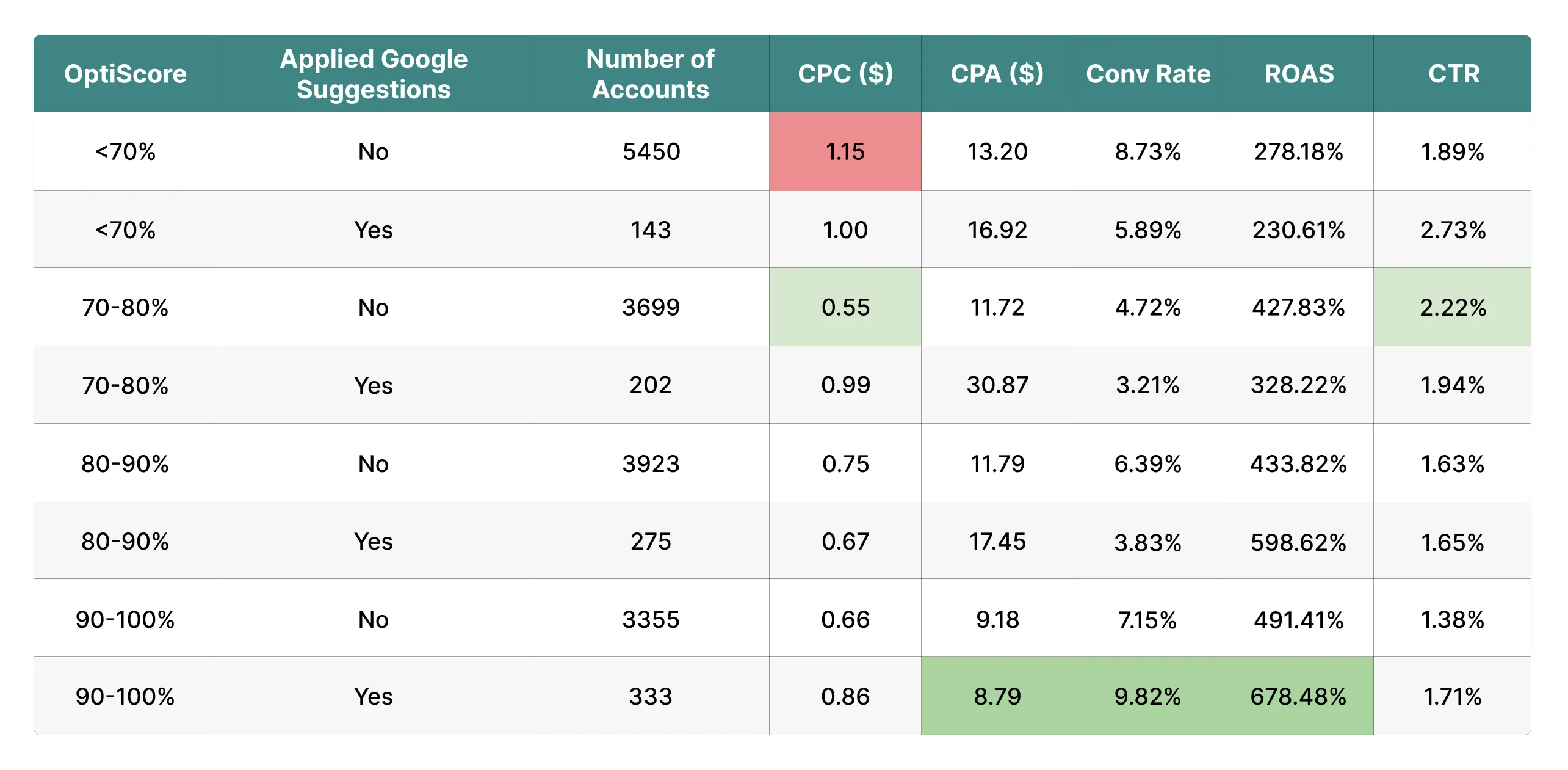
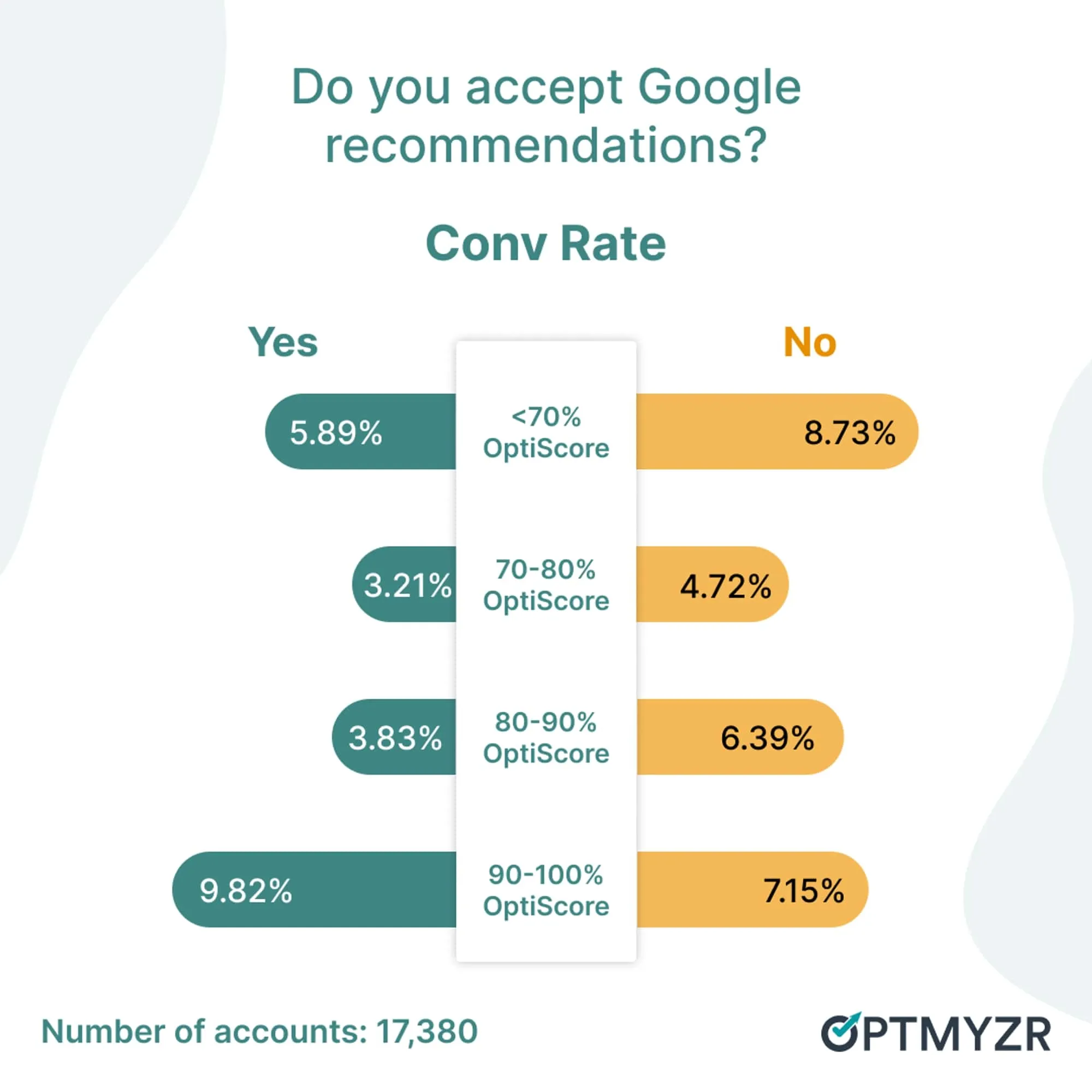
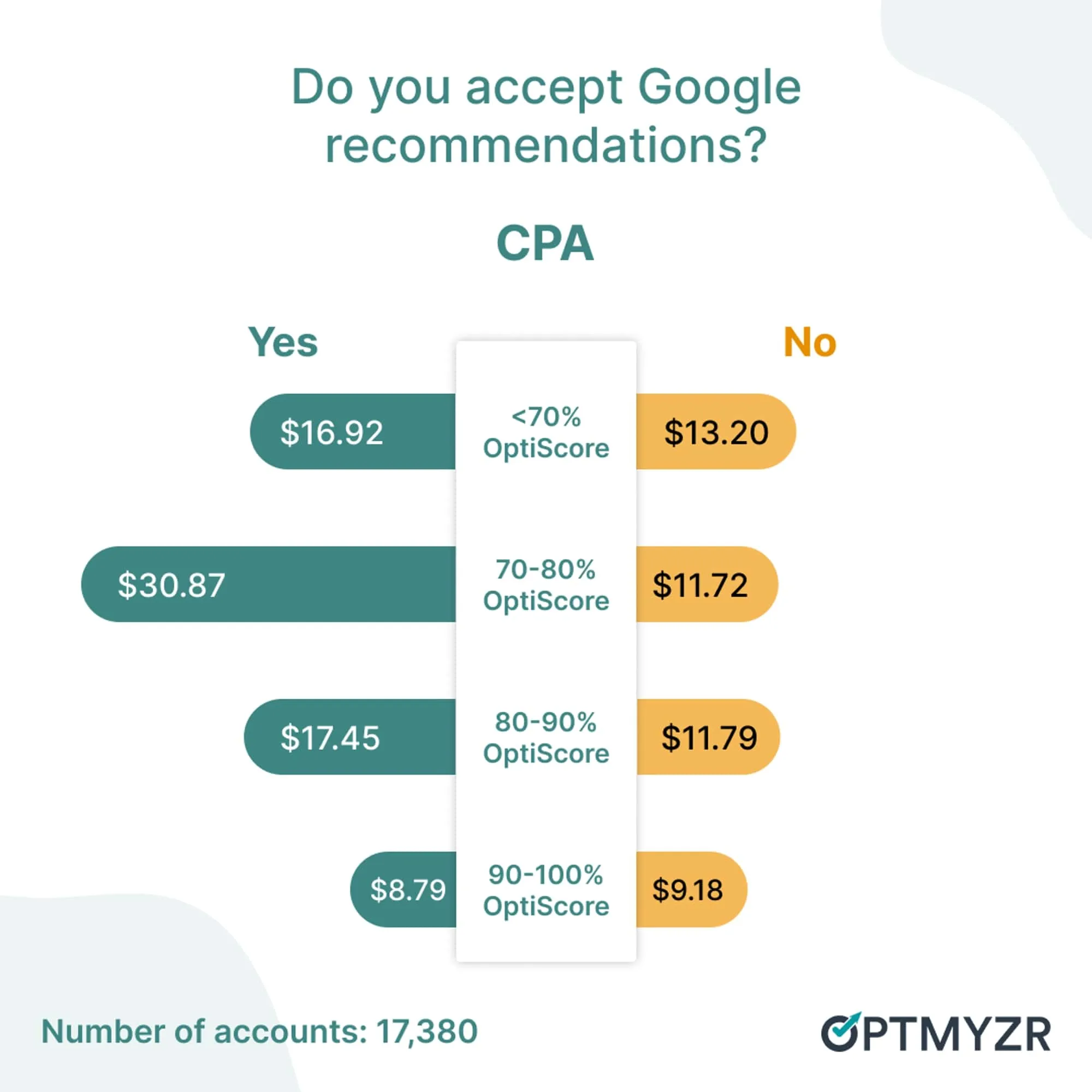
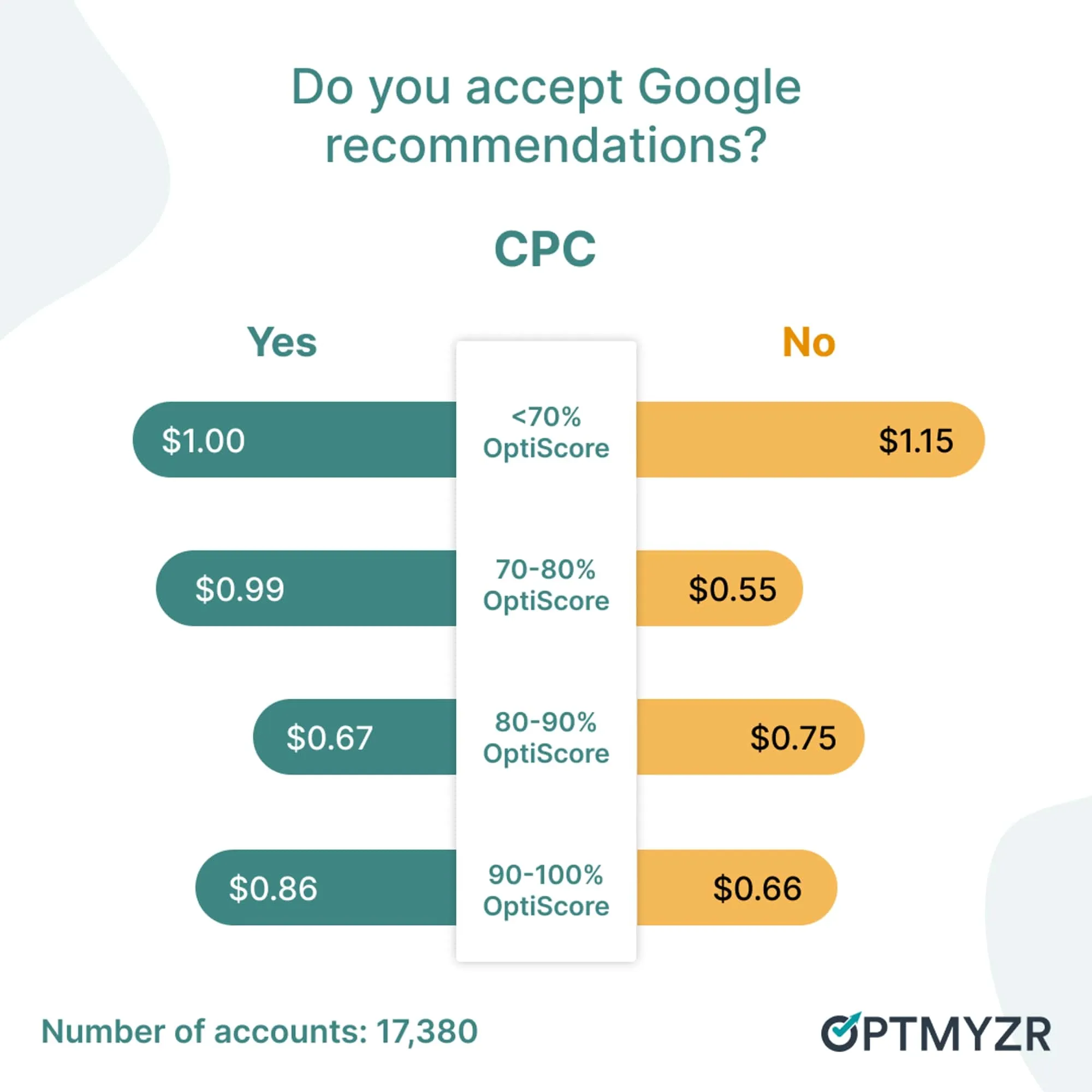
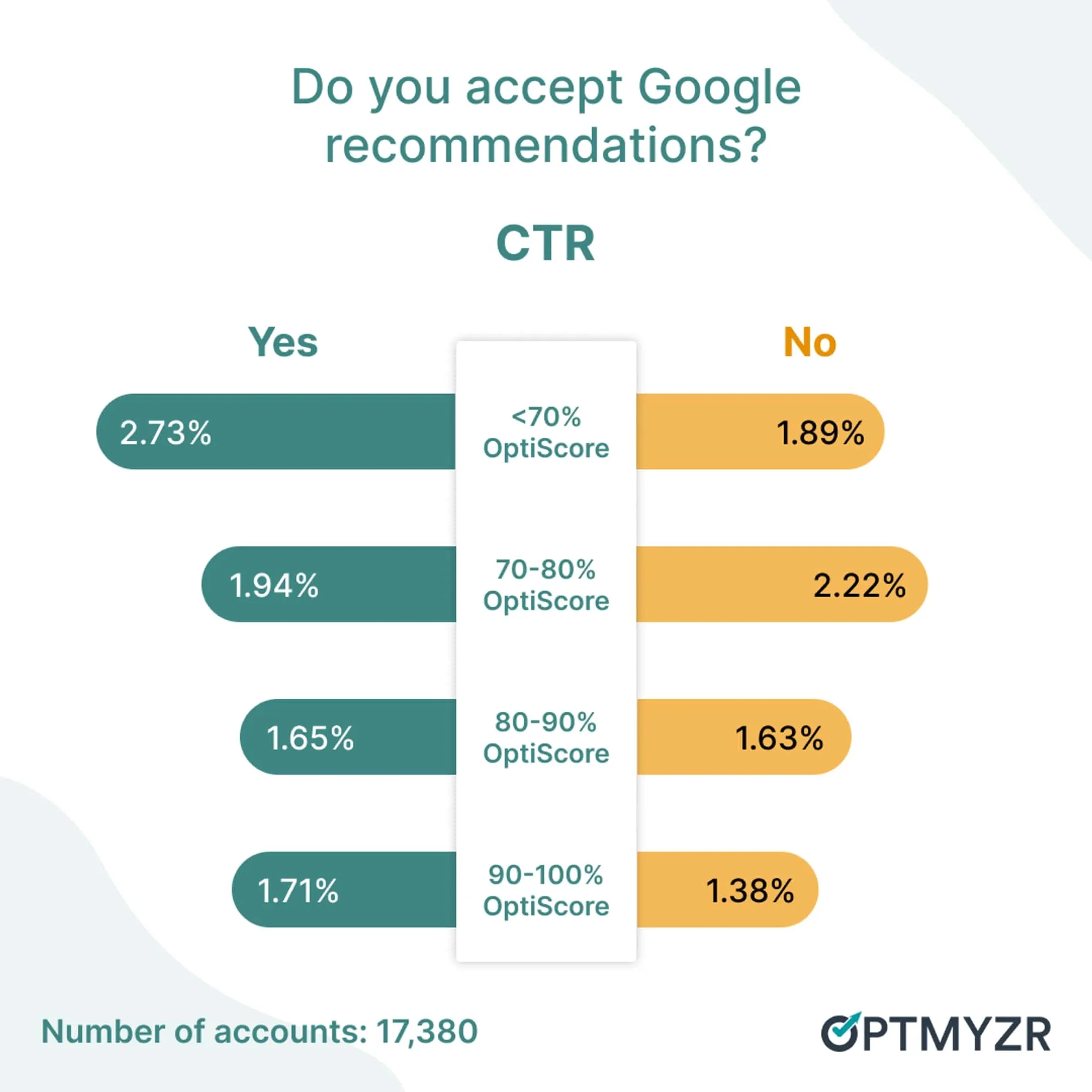
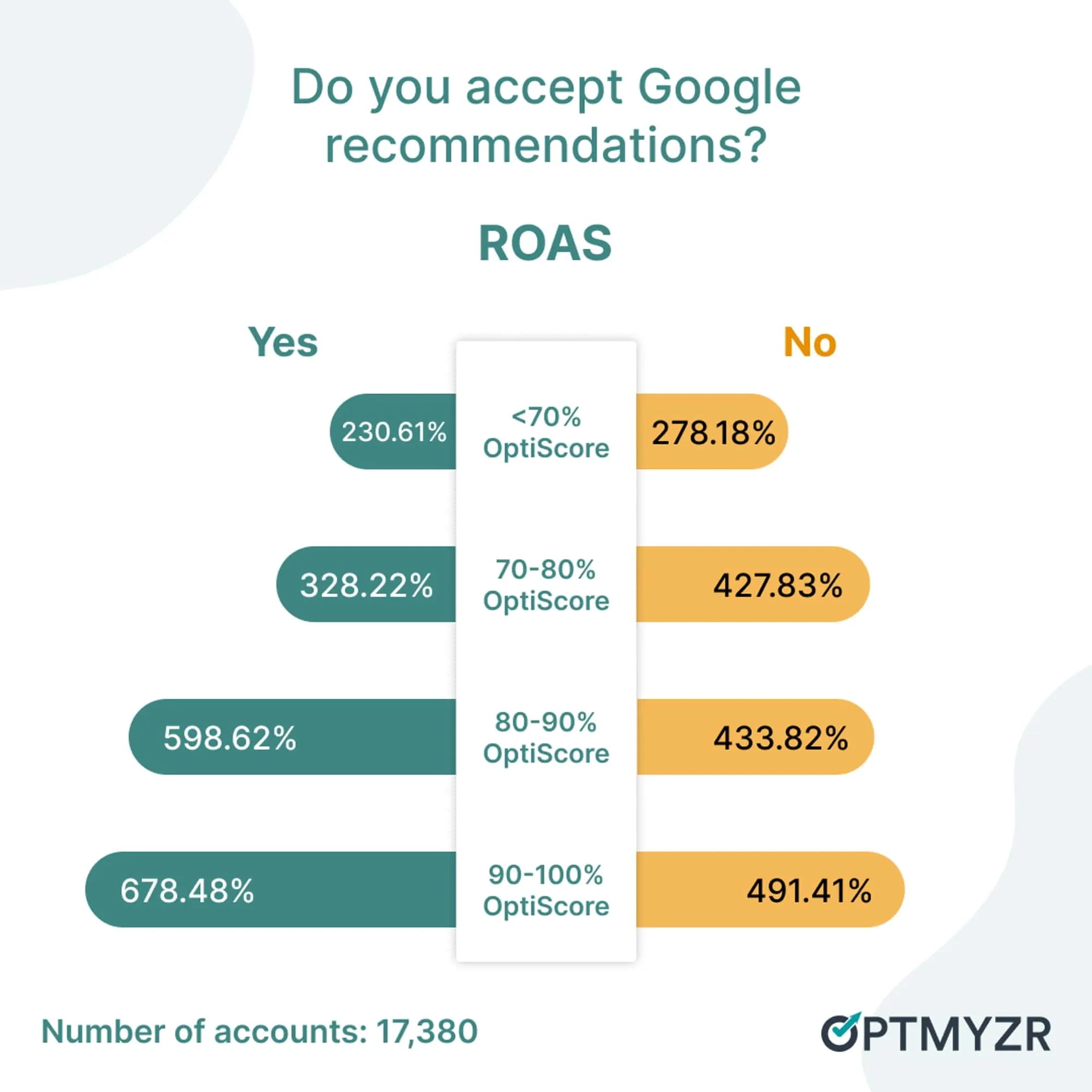
While the vast majority of accounts (95%) do not accept Google suggestions, it’s worth acknowledging that the accounts with the best performance did accept Google recommendations and have an OptiScore of 90+. The data suggests that advertisers may have raised their scores by rejecting suggestions, however that didn’t always lead to the best results.
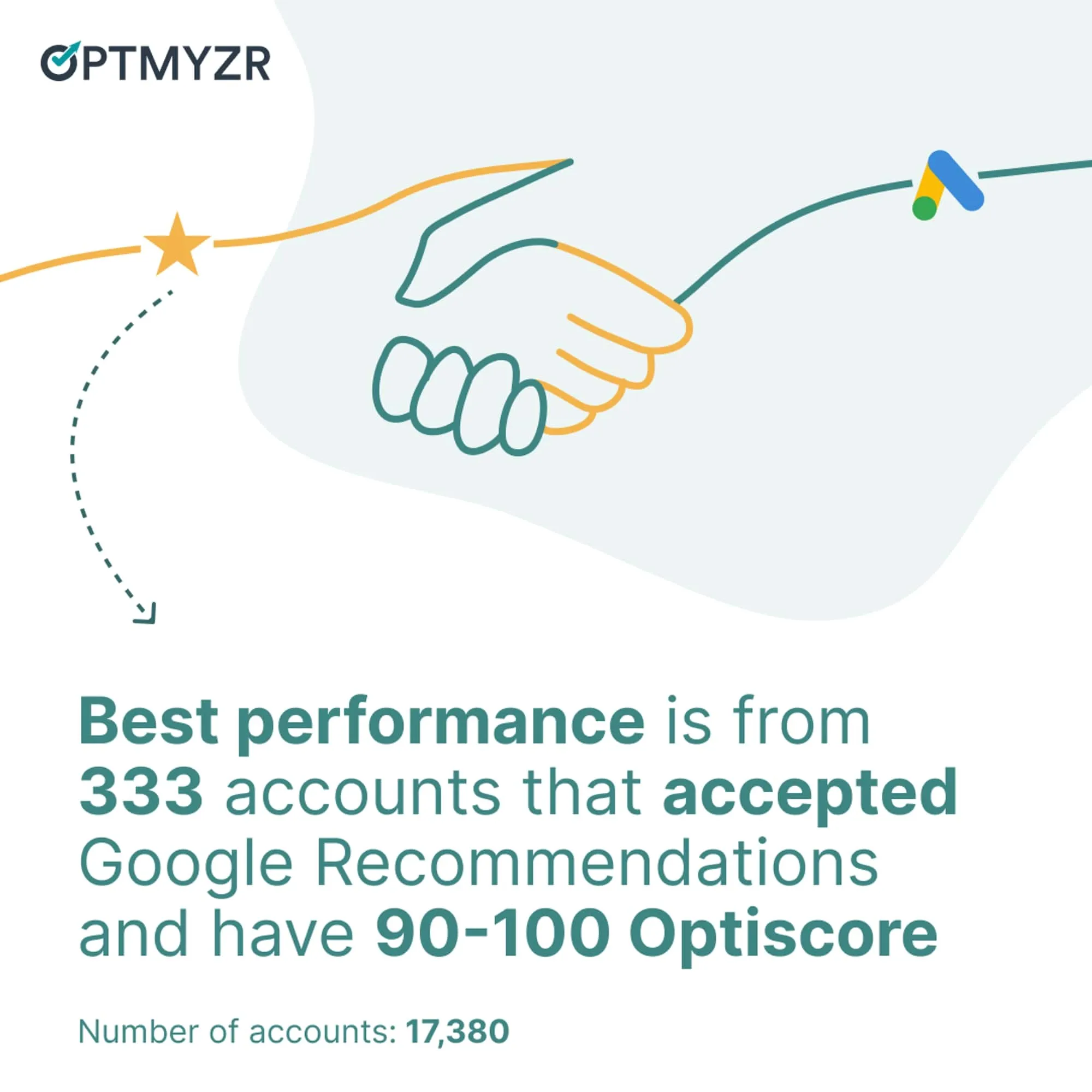
A few notes:
- The suggestions varied across accounts, however the most common accepted suggestions revolved around hygiene fixes (e.g., conflicting negatives, missing assets, other clean up alerts).
- Accounts that rejected suggestions may have still done the suggested action, but at a different time.
The main takeaway here is that you shouldn’t dismiss Google suggestions out of hand. An additional takeaway is that advertisers who are active in their accounts tend to see higher OptiScores, which does seem to correlate with improved performance.
Q3: Does ad spend play a role In OptiScore?
There has been a bit of skepticism around Google and how much spend plays a role in ‘favorable treatment’. While this wasn’t directly asked by the community, we thought it would be interesting to see whether spend impacts OptiScore. Here’s the raw data:
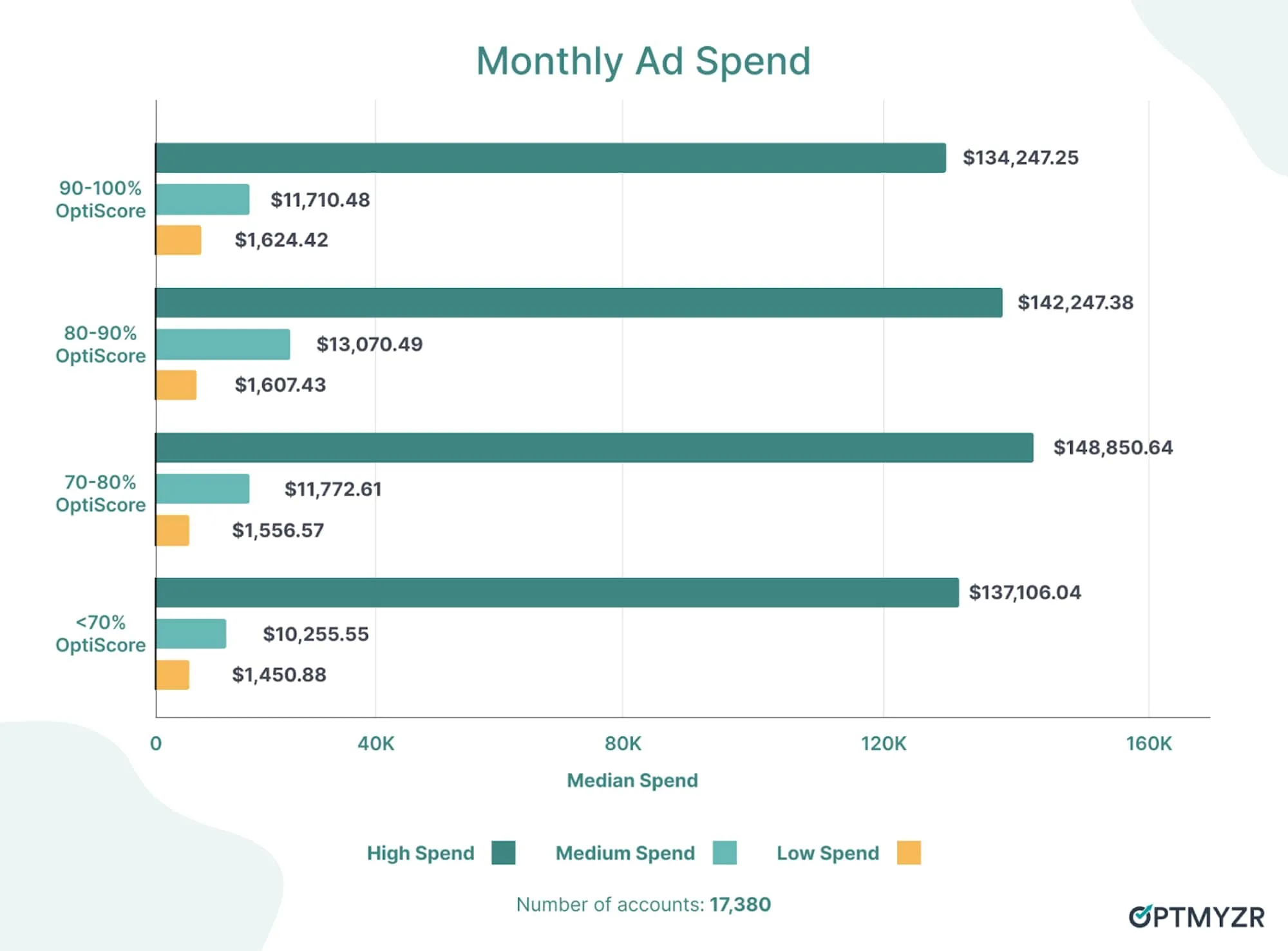
Spend is flat between the OptiScore brackets, and there’s no obvious correlation between spend levels and OptiScore.
While one could argue that jumping from sub-70 to 70–80 does add cost, the cost fades away in the upper brackets. This bracket had the best CTR, so it’s possible the increased spend is tied to advertisers doing a great job writing compelling ads that couldn’t capture conversions (either due to user experience or privacy).
Strategies for Leveraging OptiScore
Now that we’ve explored the data…what do we do with it? Should OptiScore be the new quality score?
No, but we also shouldn’t dismiss it. While Optiscore will not impact how you enter the auction, the data is undeniable that it can serve as a useful health indicator of where to work in accounts. While sub-70 accounts can see success, the strongest performance is in the 90+ bracket.
Don’t make it a goal to raise your OptiScore, which can be done through rejecting suggestions. Instead, focus on improving your account (with guidance from OptiScore). As Ginny Marvin, Google’s ads liaison shared:
The recommendations that surface with OptiScore refresh in real time and are based on your performance history and both inferred and expressed campaign goals (e.g., your bid strategy) as well as broader trends and market data. I tend to see two misperceptions about OptiDcore that keep advertisers from utilizing it effectively.
The first misperception is that OptiScore has a direct impact on performance. As with other diagnostic tools in Google Ads, such as Ad Strength and Quality score, OptiScore has no influence on the auction. On the other end of the spectrum is the second misperception that it’s simply a vanity metric that doesn’t reflect meaningful insights. OptiScore reflects how well your account and active campaigns are set up to perform.
While not all recommendations may be relevant (you know your business best), we continue to see that, on average, higher OptiScores correlate to better advertiser outcomes. Understanding what your OptiScore reflects, and reviewing the recommendations with an eye toward your goals, can help you surface new opportunities and prioritize where to focus your optimization efforts.
If you’re an Optmyzr customer, you can find OptiScore highlighted in Audits. Now that we know there is a positive correlation between OptiScore and account performance, we will begin looking at expanding its utility in Optmyzr’s suite of tools.
If you’re not an Optmyzr customer, the best way to leverage OptiScore is to use it as a focusing tool, as well as a weighting system to prioritize which optimizations/tests to perform.
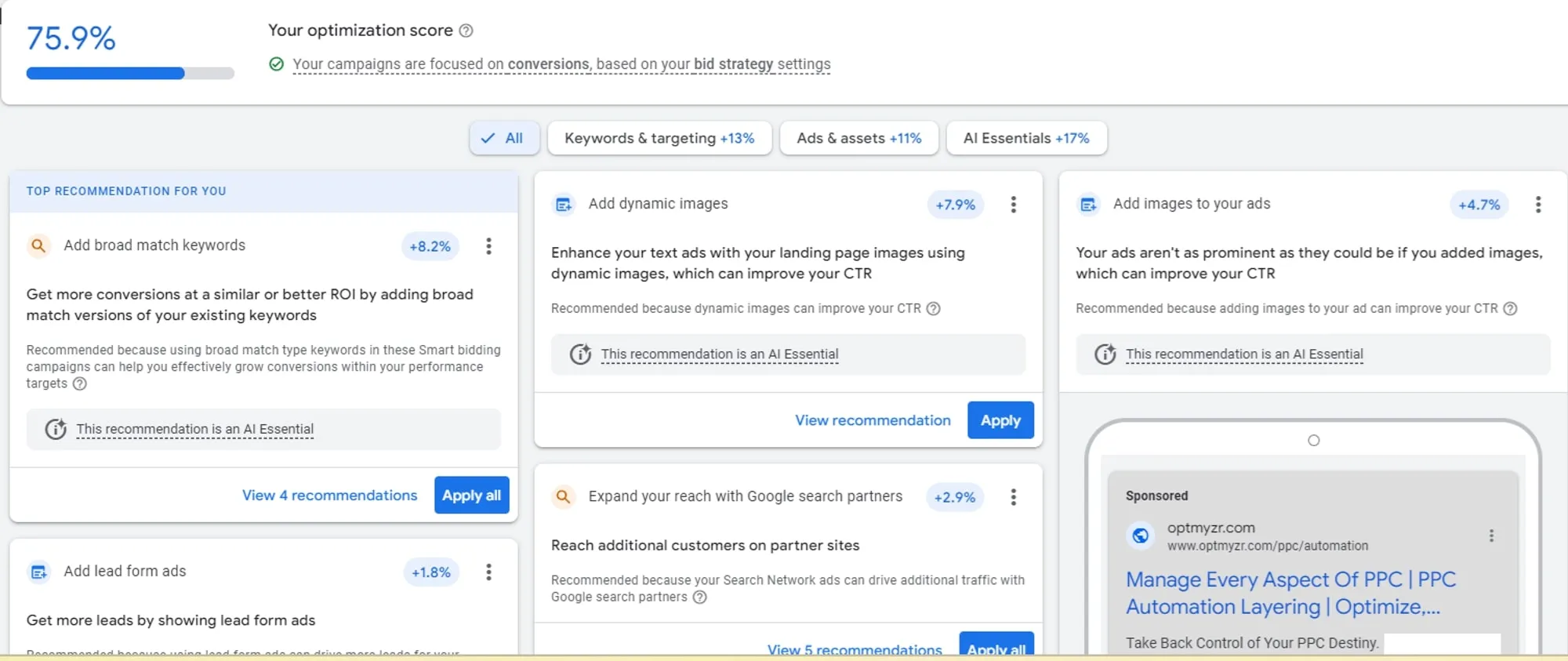
Thoughts From PPC Experts
We asked PPC experts to weigh in on the data with their honest takes. The responses were mixed.
Pleasantly Surprised

I was pleasantly surprised to see a correlation between higher OptiScore and better campaign results (lower CPA/higher ROAS). I was more surprised to see even better results for those that accept rather than dismiss Google’s recommendations.
None of us, not even Google, would conclude that higher OptiScore is the cause of better results - though we all owe Googlers an apology for how much we’ve mocked their OptiScore stats over the years! I think the true cause for both higher scores and better results is a) actively managing and ’looking after’ an account, and b) being open to considering new ideas and opportunities.
— Jyll Saskin Gales, Google Ads Coach, jyll.ca
Most experts are quite critical of Google’s recommendations, especially when it comes to OptiScore (myself included). However, I am also willing to eat my words when proven wrong. I was quite surprised by the clear correlation between OptiScore & ROAS, CPA & CVR (and yes, I did my own analysis).
I’ve always maintained that not all recommendations are useless and that you should judge them by their usefulness for your accounts. I guess now it’s time to go back to my accounts and see what else can be implemented.
— Boris Beceric, Google Ads Consultant, BorisBeceric.com
The results were very interesting to me, as a member of camp ‘reject most suggestions.’ I imagine that the level of expertise of the account manager plays a role, sometimes what Google suggests is an action I was already going to take. I’d recommend that nobody blindly dismisses or accepts recommendations and instead considers them carefully, as you are the only one with context. I also believe ecommerce clients should pay particular attention to the ROAS results of this study!
Google isn’t inside the accounts but I know I’ll be more carefully considering their suggestions going forward and I believe the season of ‘blindly dismiss’ (if that’s been your MO) being the default has come to an end.
— Amalia Fowler, Owner, Good AF Consulting
I worked at Google on the Google Optimization project and have seen firsthand how some recommendations from the system can be highly relevant. For instance, addressing conflicting keywords, fixing conversion tracking issues, and implementing enhanced conversions are all critical for improving campaign performance. Additionally, adjusting ROAS targets or increasing target CPA during peak auction times can also bring better results.
This data reassures me that recommendations correlate positively with performance. However, I still believe that certain areas, such as adding new keywords or changing match types to broad match, require further improvement. Overall, the study’s outcomes are pleasantly surprising and validate the use of some of Google’s optimization suggestions.
— Thomas Eccel, Senior Performance Marketing Manager, Jung von Matt Impact
Skeptical or Indifferent
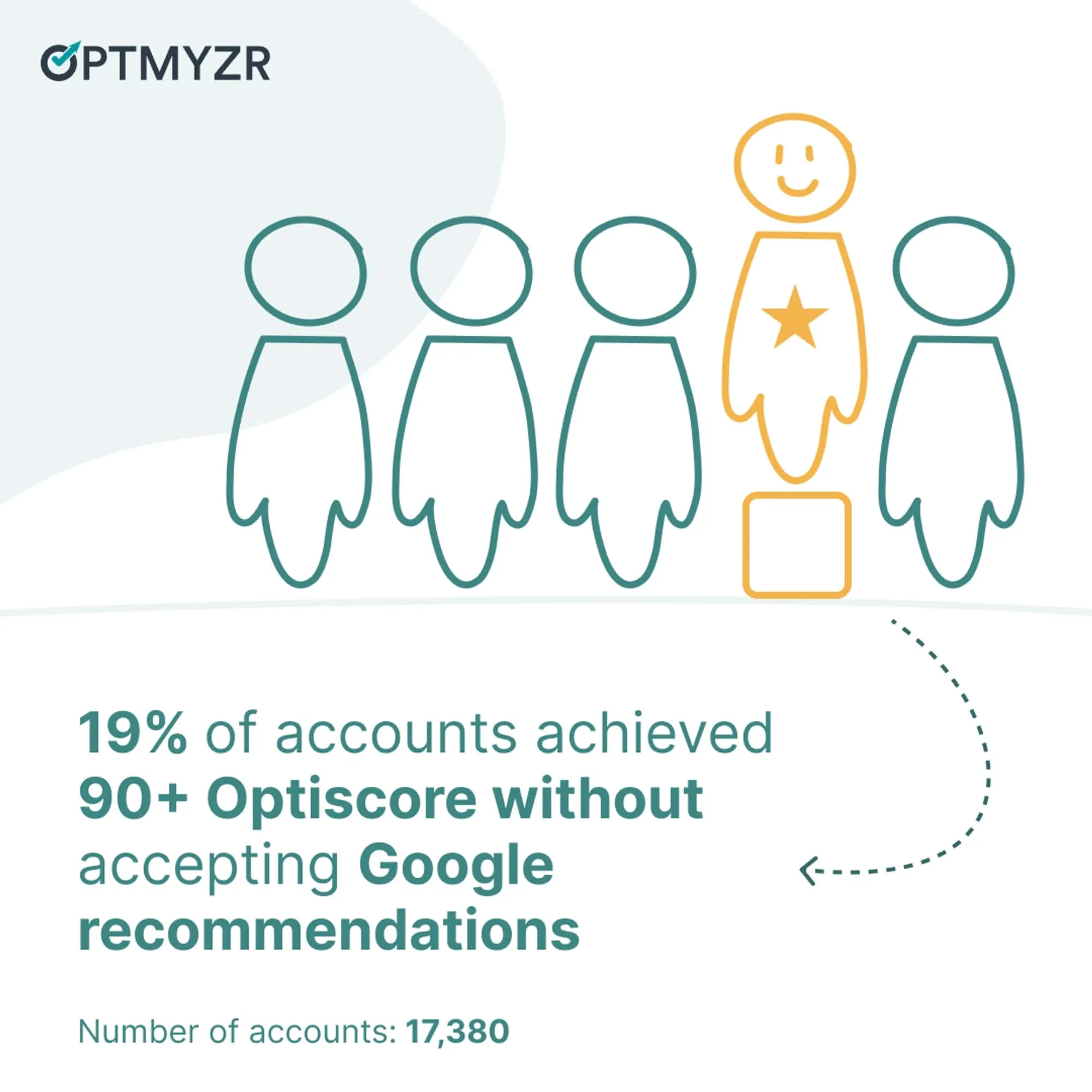
The Optmyzr study highlights benefits to Google’s OptiScore and suggestions, (which is seen especially in the 90–100 range), with a better CPA and ROAS compared to the lower OptiScore brackets.
This study supports what I tend to believe and it is great to have the data to prove that some recommendations directly found in the Google Ads interface are beneficial to account performance.
All that said, the Google interface and Google reps independent of the study push the score. Google pushing the score gives me pause, even when independent study data supports that OptiScore’s net positive on performance.
— Sarah Stemen, Business Owner, Sarah Stemen, LLC
While I don’t pay much attention to OptiScore or give much value to recommendations, we do review recommendations on an ongoing basis because they can surface some things we may not have seen as easily.
— Menachem Ani, Founder, JXT Group
I usually reject most of the recommendations and ignore OptiScore, unless we are about to lose our Google Partner Badge. After checking all of our accounts, I would like to add that nowadays the recommendations have increased in number and in variety than several years ago. Search is much more visual, and for instance, accepting the recommendation to add more images or enable dynamic images is rather beneficial with less risk for harm. Improving ads and assets, in general, makes sense too.
Our smallest accounts suffer most in terms of OptiScore because the system does not like limited budgets—for some of them, a budget increase might improve the score by 13%. For lead gen and gambling accounts (which underlie strict regulations), PMax would bring a score improvement of over 10%, which again does not make sense business-wise. Switching accounts optimizing on CAC to Target-ROAS for the sake of several OptiScore points already goes in the direction of business suicide.
— Georgi Zayakov, Senior Consultant Digital Advertising, Hutter Consult AG
Summary & Final Takeaways
OptiScore is not and should never be a KPI. It is a useful tool to focus work, though it should not be the only tool you use. Make sure you balance all recommendations from Google with the actions and optimizations that best serve your campaigns and business.
If you would like to have a third party to sanity check recommendations and strategies, check out Optmzyr’s PPC Management suite for Google and beyond.






